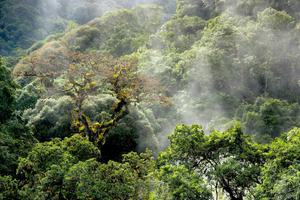Climate change is altering the age and structure of the world’s forests, driving an increase in younger and shorter trees over the last century, according to a new study published in the journal Science. Since 1900, the world has lost more than a third of its old-growth forests.
The changes in forest composition are the result of rising temperatures and carbon dioxide levels, which are causing increased environmental stress, an uptick in carbon dioxide fertilization, and an increase in the severity and frequency of extreme events such as wildfires and droughts.
“This trend is likely to continue with climate warming,” Nate McDowell, an earth systems scientist at the U.S. Department of Energy’s Pacific Northwest National Laboratory and lead author of the new study, said in a statement. “A future planet with fewer large, old forests will be very different than what we have grown accustomed to. Older forests often host much higher biodiversity than young forests and they store more carbon than young forests.”
The research, conducted by nearly two dozen scientists from around the world, used decades of satellite imagery and more than 160 previous studies to analyze the health of the world’s forests.
Climate change, combined with human land use decisions, such as logging and the conversion of forests to agriculture, have led to an acceleration of tree mortality rates globally, as well as a shift to younger, shorter forests. In North America and Europe, tree mortality has doubled in the past 40 years.
Rising temperatures limit photosynthesis, for example, stunting tree growth. More severe wildfires are burning biomass and also making it hard for forests to regenerate. Droughts can kill trees and create conditions for insect or pathogen attacks. And these changes — both as a result of global warming and human activities — are happening so quickly, forests don’t have time to recover, the scientists said.
“It’s not a shock but it’s very sad,” Kristina Anderson-Teixeira, an ecologist and leader of the ForestGEO Ecosystems & Climate Program at the Smithsonian Conservation Biology Institute and a co-author of the study, told NPR. “We as a human society are hitting these forests so rapidly with so many different changes that they can’t keep up.”



